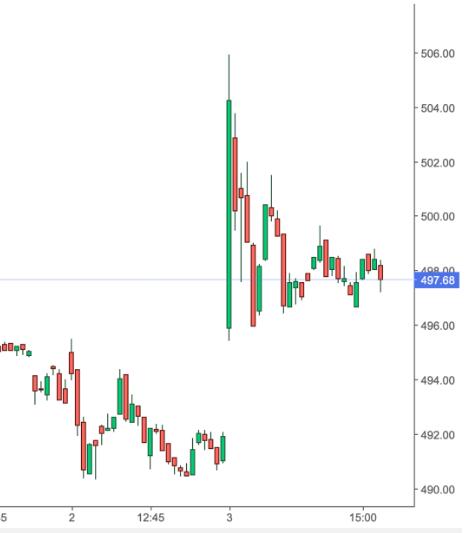Oversupply of chips in the future? Steady Broadcom does not seek explosive growth in performance

In the past two years, facts have proven that investors who bet on chip stocks have become big winners. Chips are used in notebook computers, mobile phones and data centers, and their demand broke out during the pandemic, and global high-end chip manufacturers are even unable to meet the demand.
Since the U.S. stock market crash in March 2020, the chip industry benchmark index Philadelphia Semiconductor Index has soared by more than 180%, and some of the large chip manufacturers such as Nvidia (NASDAQ:NVDA) and AMD (NASDAQ:AMD) have achieved amazing returns , Their market value has greatly expanded.
There is no sign that this grand banquet will end soon. Taiwan Semiconductor Manufacturing Co. (NYSE: TSM), the world's largest foundry for advanced process chips, expects its sales in 2021 to increase by 20%. This company also helps Apple (NASDAQ:AAPL) foundry chips, and is also an important partner of many large car companies around the world. The chip shortage is expected to last until 2022.
But looking back at history, the chip industry is also an industry that is highly cyclical and the supply and demand situation will change rapidly. The unprecedented chip investment has also raised concerns about possible oversupply in the industry. The large increase in production capacity in the next few years may severely hit high chip company stock prices.
If you are looking for a relatively safe low-volatility chip stock, Broadcom (NASDAQ:AVGO) may be worth studying. The company's switch chips and custom chips are widely used in Alphabet's Google (NASDAQ: GOOGL) Amazon AWS (NASDAQ: AMZN). Broadcom is also a major supplier of chips for set-top boxes and routers.
Broadcom's financial report released last week was once again better than analysts expected. In the third fiscal quarter ended August 1, Broadcom's adjusted earnings per share increased to 6.96 US dollars, and revenue increased 16% to 6.78 billion US dollars. Analysts expect earnings per share of 6.85 US dollars and revenue of 6.76 billion US dollars.
The company also expects fourth-quarter revenue to be 7.35 billion U.S. dollars, with analysts expecting an average of 7.23 billion U.S. dollars. Broadcom's growth strategy also has a distinctive feature, that is, in response to the future slowdown in demand, the company did not oversupply products to customers.
The company’s CEO Hock Tan told investors on Thursday that although the demand for chips has surged, the company tightly controls orders to avoid oversupply in the future.
He said, "We could have achieved higher performance, but it means we are hoarding inventory in the wrong place." Broadcom is practicing "supply discipline" and focusing on real demand.
Broadcom covers a wide range of industries, which also provides investors with a reliable source of income and more upside potential. Although Broadcom's share price has soared by more than 120% in the past three years, its dividend has also increased substantially. The company's dividend has more than tripled, from $1.02 per quarter in 2017 to $3.60.
Currently, Broadcom's dividend yield is about 3%, which is higher than the average of the S&P 500 index constituent companies.
Thanks to the strong demand for chips, Broadcom has excellent conditions to distribute generous dividends to investors. Customers have already booked 90% of Broadcom's products in 2021, and usually the proportion of advance reservations will only account for a quarter of the total supply.



